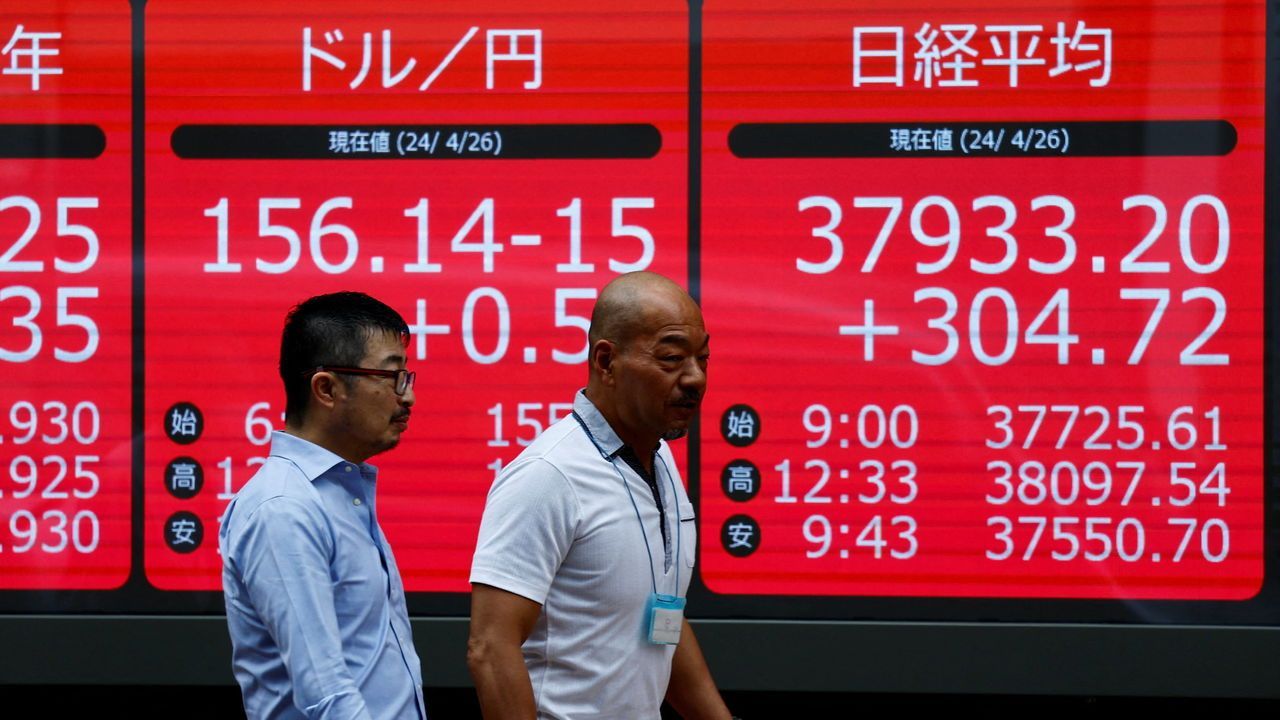Japan will struggle to rescue its plummeting currency
 T he yen is on a wild ride. In early trading, as Asian markets opened on April 29th, the currency plummeted to a 34-year low of 160 to the dollar, adding to its hefty fall against the greenback over the past three years (see chart). In the afternoon, the decline reversed sharply. The yen rose by more than 2%, ending the trading day in Asia back at 155 to the dollar.
T he yen is on a wild ride. In early trading, as Asian markets opened on April 29th, the currency plummeted to a 34-year low of 160 to the dollar, adding to its hefty fall against the greenback over the past three years (see chart). In the afternoon, the decline reversed sharply. The yen rose by more than 2%, ending the trading day in Asia back at 155 to the dollar.
Its reversal prompted rumours of intervention by the Bank of Japan (BOJ), acting on behalf of the finance ministry. Officials declined to comment, but said the yen’s volatility was excessive. Data on interventions are released with a delay. The last time officials acted to prop up the currency, in 2022, they burned through over $60bn in foreign-exchange reserves.
There is little relief in sight. With inflation in America still above the Federal Reserve’s target of 2%, interest-rate cuts are no longer expected imminently, which has caused the dollar to strengthen. The comparison with Japan, where rates remain ultra-low, is stark. Although the BOJ in effect ended its policy of yield-curve control and raised its benchmark rate from between minus 0. 1% and zero to between zero and 0. 1% in March, the shift is small in an international context. American, British and euro-zone benchmark interest rates have each risen by at least 4. 5 percentage points since 2022. Investing in assets outside Japan simply provides higher returns.
Other factors reinforce the yen’s weakness. Japan is the world’s largest creditor, with a huge stock of investments overseas that are generated by the savings of thrifty corporations and households. Returns from investments abroad surged to ¥57trn ($400bn) in the year to February—more than double the amount a decade ago. Yet the firms involved do not seem to repatriate much foreign profit. Instead, as Karakama Daisuke of Mizuho Bank has noted, they reinvest overseas in assets that produce better returns, reducing demand for yen. Mr Karakama even suggests that Japan’s current account may not actually have been in surplus, as official statistics suggest, in 2022 and 2023.
What does a weaker yen mean for Japan’s economy? The price of imported goods has climbed by an eye-watering 64% since 2020. Japan imports almost all its fuel, so businesses and households face higher energy costs. And the impact on exporters is less positive than it once would have been. A falling yen may make goods produced by domestic firms cheaper, but today Japanese companies have big operations in Europe, North America and South-East Asia. The greatest upside may now be for the tourist industry, as the slumping yen makes holidaying in the country cheaper. In February 2. 8m travellers arrived, up by 89% from the same month last year and 7% from the same month in 2019, before covid-19.
A weak yen is unpopular with Japanese consumers, who suffer higher prices, and thus with politicians, too. The country’s central bankers also fret when the currency moves rapidly, and are loth to give speculators influence over monetary policy. Yet they lack good options. To keep the yen from weakening further in the short term, analysts at Bank of America reckon that they would probably have to make even bigger interventions than in 2022. Neither the huge gap between Japanese interest rates and those in the rest of the world nor the behaviour of Japanese companies is set to change soon. BOJ officials have stressed the interest-rate rise in March is not intended to be the first of many. As a result, the future is one of further yen weakness, or of enormous spending to prevent it. ■
For more expert analysis of the biggest stories in economics, finance and markets, sign up to Money Talks, our weekly subscriber-only newsletter.
And to build holiday resorts
With the prospect of cheaper money receding, shares look unusually vulnerable
What that tells you about the country’s economic woes


 Advertising on our project is a great way to promote a brand and attract new customers for your company!
Advertising on our project is a great way to promote a brand and attract new customers for your company!  AUD: 0.6642 $
AUD: 0.6642 $  CAD: 0.7337 $
CAD: 0.7337 $  CHF: 1.1053 $
CHF: 1.1053 $  CNY: 0.1385 $
CNY: 0.1385 $  EUR: 1.0832 $
EUR: 1.0832 $  GBP: 1.2619 $
GBP: 1.2619 $  JPY: 0.0064 $
JPY: 0.0064 $  RUB: 0.0110 $
RUB: 0.0110 $ 




























